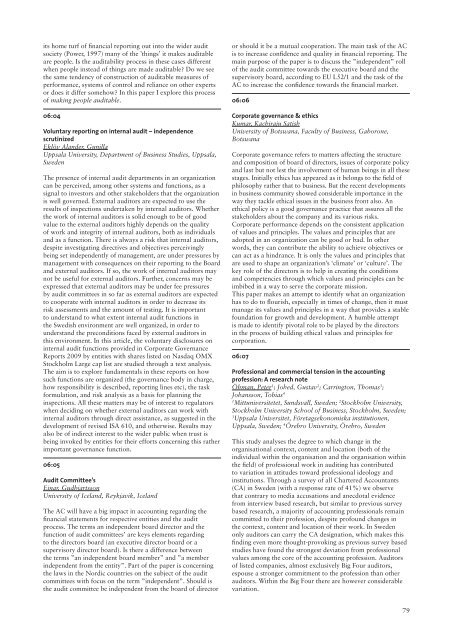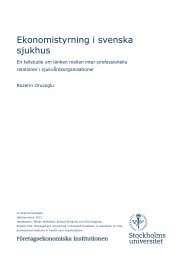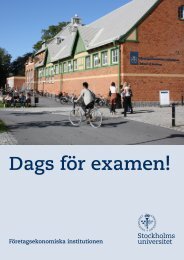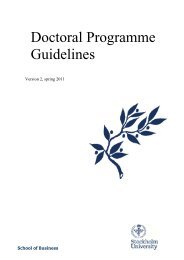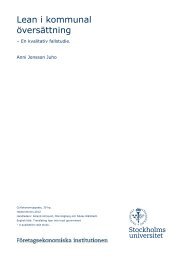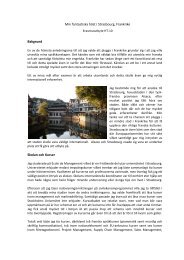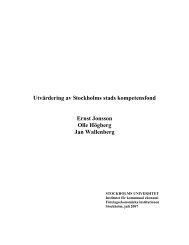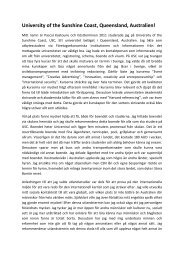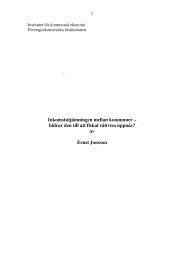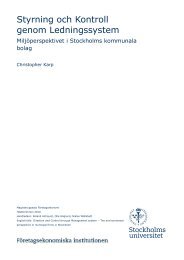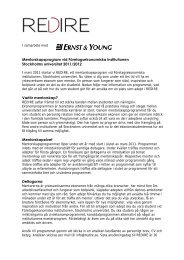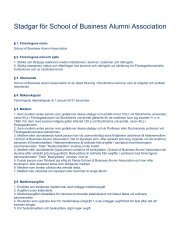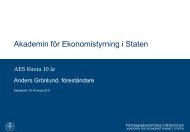Download full programme and abstract book pdf 1.6
Download full programme and abstract book pdf 1.6
Download full programme and abstract book pdf 1.6
Create successful ePaper yourself
Turn your PDF publications into a flip-book with our unique Google optimized e-Paper software.
its home turf of financial reporting out into the wider audit<br />
society (Power, 1997) many of the ’things’ it makes auditable<br />
are people. Is the auditability process in these cases different<br />
when people instead of things are made auditable? Do we see<br />
the same tendency of construction of auditable measures of<br />
performance, systems of control <strong>and</strong> reliance on other experts<br />
or does it differ somehow? In this paper I explore this process<br />
of making people auditable.<br />
06:04<br />
Voluntary reporting on internal audit – independence<br />
scrutinized<br />
Eklöv Al<strong>and</strong>er, Gunilla<br />
Uppsala University, Department of Business Studies, Uppsala,<br />
Sweden<br />
The presence of internal audit departments in an organization<br />
can be perceived, among other systems <strong>and</strong> functions, as a<br />
signal to investors <strong>and</strong> other stakeholders that the organization<br />
is well governed. External auditors are expected to use the<br />
results of inspections undertaken by internal auditors. Whether<br />
the work of internal auditors is solid enough to be of good<br />
value to the external auditors highly depends on the quality<br />
of work <strong>and</strong> integrity of internal auditors, both as individuals<br />
<strong>and</strong> as a function. There is always a risk that internal auditors,<br />
despite investigating directives <strong>and</strong> objectives perceivingly<br />
being set independently of management, are under pressures by<br />
management with consequences on their reporting to the Board<br />
<strong>and</strong> external auditors. If so, the work of internal auditors may<br />
not be useful for external auditors. Further, concerns may be<br />
expressed that external auditors may be under fee pressures<br />
by audit committees in so far as external auditors are expected<br />
to cooperate with internal auditors in order to decrease its<br />
risk assessments <strong>and</strong> the amount of testing. It is important<br />
to underst<strong>and</strong> to what extent internal audit functions in<br />
the Swedish environment are well organized, in order to<br />
underst<strong>and</strong> the preconditions faced by external auditors in<br />
this environment. In this article, the voluntary disclosures on<br />
internal audit functions provided in Corporate Governance<br />
Reports 2009 by entities with shares listed on Nasdaq OMX<br />
Stockholm Large cap list are studied through a text analysis.<br />
The aim is to explore fundamentals in these reports on how<br />
such functions are organized (the governance body in charge,<br />
how responsibility is described, reporting lines etc), the task<br />
formulation, <strong>and</strong> risk analysis as a basis for planning the<br />
inspections. All these matters may be of interest to regulators<br />
when deciding on whether external auditors can work with<br />
internal auditors through direct assistance, as suggested in the<br />
development of revised ISA 610, <strong>and</strong> otherwise. Results may<br />
also be of indirect interest to the wider public when trust is<br />
being invoked by entities for their efforts concerning this rather<br />
important governance function.<br />
06:05<br />
Audit Committee’s<br />
Einar, Gudbjartsson<br />
University of Icel<strong>and</strong>, Reykjavik, Icel<strong>and</strong><br />
The AC will have a big impact in accounting regarding the<br />
financial statements for respective entities <strong>and</strong> the audit<br />
process. The terms an independent board director <strong>and</strong> the<br />
function of audit committees’ are keys elements regarding<br />
to the directors board (an executive director board or a<br />
supervisory director board). Is there a difference between<br />
the terms ”an independent board member” <strong>and</strong> ”a member<br />
independent from the entity”. Part of the paper is concerning<br />
the laws in the Nordic countries on the subject of the audit<br />
committees with focus on the term ”independent”. Should is<br />
the audit committee be independent from the board of director<br />
or should it be a mutual cooperation. The main task of the AC<br />
is to increase confidence <strong>and</strong> quality in financial reporting. The<br />
main purpose of the paper is to discuss the ”independent” roll<br />
of the audit committee towards the executive board <strong>and</strong> the<br />
supervisory board, according to EU L52/1 <strong>and</strong> the task of the<br />
AC to increase the confidence towards the financial market.<br />
06:06<br />
Corporate governance & ethics<br />
Kumar, Kachiraju Satish<br />
University of Botswana, Faculty of Business, Gaborone,<br />
Botswana<br />
Corporate governance refers to matters affecting the structure<br />
<strong>and</strong> composition of board of directors, issues of corporate policy<br />
<strong>and</strong> last but not lest the involvement of human beings in all these<br />
stages. Initially ethics has appeared as it belongs to the field of<br />
philosophy rather that to business. But the recent developments<br />
in business community showed considerable importance in the<br />
way they tackle ethical issues in the business front also. An<br />
ethical policy is a good governance practice that assures all the<br />
stakeholders about the company <strong>and</strong> its various risks.<br />
Corporate performance depends on the consistent application<br />
of values <strong>and</strong> principles. The values <strong>and</strong> principles that are<br />
adopted in an organization can be good or bad. In other<br />
words, they can contribute the ability to achieve objectives or<br />
can act as a hindrance. It is only the values <strong>and</strong> principles that<br />
are used to shape an organization’s ‘climate’ or ‘culture’. The<br />
key role of the directors is to help in creating the conditions<br />
<strong>and</strong> competencies through which values <strong>and</strong> principles can be<br />
imbibed in a way to serve the corporate mission.<br />
This paper makes an attempt to identify what an organization<br />
has to do to flourish, especially in times of change, then it must<br />
manage its values <strong>and</strong> principles in a way that provides a stable<br />
foundation for growth <strong>and</strong> development. A humble attempt<br />
is made to identify pivotal role to be played by the directors<br />
in the process of building ethical values <strong>and</strong> principles for<br />
corporation.<br />
06:07<br />
Professional <strong>and</strong> commercial tension in the accounting<br />
profession: A research note<br />
Öhman, Peter 1 ; Johed, Gustav 2 ; Carrington, Thomas 3 ;<br />
Johansson, Tobias 4<br />
1 Mittuniversitetet, Sundsvall, Sweden; 2 Stockholm University,<br />
Stockholm University School of Business, Stockholm, Sweden;<br />
3 Uppsala Universitet, Företagsekonomiska institutionen,<br />
Uppsala, Sweden; 4 Örebro University, Örebro, Sweden<br />
This study analyses the degree to which change in the<br />
organisational context, content <strong>and</strong> location (both of the<br />
individual within the organisation <strong>and</strong> the organisation within<br />
the field) of professional work in auditing has contributed<br />
to variation in attitudes toward professional ideology <strong>and</strong><br />
institutions. Through a survey of all Chartered Accountants<br />
(CA) in Sweden (with a response rate of 41%) we observe<br />
that contrary to media accusations <strong>and</strong> anecdotal evidence<br />
from interview based research, but similar to previous survey<br />
based research, a majority of accounting professionals remain<br />
committed to their profession, despite profound changes in<br />
the context, content <strong>and</strong> location of their work. In Sweden<br />
only auditors can carry the CA designation, which makes this<br />
finding even more thought-provoking as previous survey based<br />
studies have found the strongest deviation from professional<br />
values among the core of the accounting profession. Auditors<br />
of listed companies, almost exclusively Big Four auditors,<br />
espouse a stronger commitment to the profession than other<br />
auditors. Within the Big Four there are however considerable<br />
variation.<br />
79


